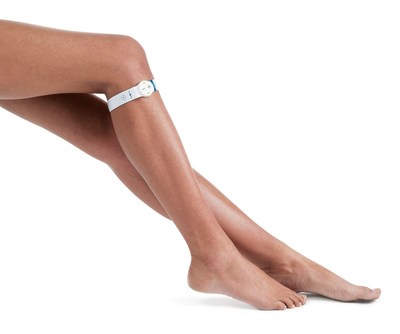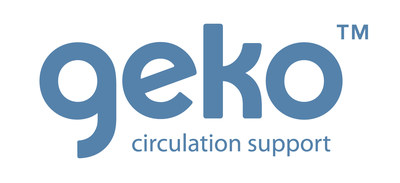- Clinical trial shows patients prescribed the geko device experienced shortened hospital stays by more than one day after a kidney transplant
- The device reduced surgical site infections by almost 60 per cent
- It also reduced swelling by 31 per cent - due to greater urine output producing less fluid retention
LONDON, June 1, 2021 /PRNewswire/ -- In a published study, a team from Lawson Health Research Institute (LHSC), in Ontario Canada, has found that a simple medical device can reduce swelling after kidney transplantation. The wearable geko device, manufactured by UK-based, Sky Medical Technology Ltd and distributed in Canada by Trudell Healthcare Solution Inc., is a small muscle pump activator that significantly increases blood flow via painless electrical pulses. Patients using the device following kidney transplantation experienced shorter hospital stays and reduced surgical site infections by nearly 60 per cent.

Kidney and simultaneous pancreas-kidney transplantations can significantly reduce mortality and improve the quality of life for patients with end stage renal disease. Dr. Alp Sener, Lawson Scientist and Transplant Surgeon in the Multi-Organ Transplant Program at LHSC, who lead the study explains: "After surgery, many of these organ recipients require a longer hospital stay due to delayed kidney function, infection, lack of mobility or oedema."
Oedema is swelling caused by excess fluid trapped in the body's tissues which can impact wound healing. The current standard of care for managing lower-limb oedema and improving blood flow in Canada healthcare systems recommend thrombo-embolic-deterrent (TED) stockings, used alongside a boot-like cuff that compresses the leg to increase blood flow, called intermittent pneumatic compression (IPC). Both can be uncomfortable to wear, and IPC can inhibit early mobility and disrupt sleep after surgery.
In a randomised controlled clinical trial spanning two years, 221 transplant recipients at LHSC were prescribed either TED stocking and IPC, or the geko device for six days after surgery. The research team found that wearing the device increased urine output by 27 per cent and lowered weight gain by over a kilogram. With more urine produced and less fluid retention, patients experienced 31 per cent less swelling and the duration of costly hospitalisation was shortened by more than one day after kidney transplantation, compared to the standard of care.
A 60 per cent reduction in wound infection rates was a striking observation. "Transplant patients are at a higher risk of infection due to the immunosuppressant medications needed after surgery," explains Dr. Sener, who is also the President of the Urologic Society for Transplantation and Renal Surgery, a global organization affiliated with the American Urological Association. "Reducing infection means a much better outcome for the patient and considering that recent data shows wound infections can cost the health care system thousands of dollars per person, it's a win-win situation."
Some of the study participants wore pedometers to track their steps, and those using the geko device also had improved mobility after surgery. The team suspects this may be due to reduced swelling which could improve ease and comfort when moving.
Dr Sener adds: "The study results have been both surprising and exciting. Not only have we cut down wound infection rates, but we have also seen a considerable improvement in the new organ's function following transplantation. Patients reported feeling more satisfied with the transplant process and are more mobile."
The geko device has been adopted into the care pathway and is now being offered to patients at LHSC in recovery after receiving a new kidney.
Ruben Garcia, 68 years old, recently received a new kidney from his daughter, Ruby, who was a match as a living kidney donor. Following his surgery, Garcia found it difficult to get out of bed due to the pain and swelling, and the function of his new kidney was very low. "My surgeon explained in very simple terms that it was as if my new kidney wasn't awake yet," describes Garcia.
Dr. Sener recommended that Garcia use the geko device to help stimulate blood flow in a way that is similar to walking. Garcia was soon able to sit up on a chair and by the next day he was walking. "My kidney woke up and started working again! I could feel the device working and it was comfortable to wear, almost like a massage for my legs. I'm very grateful for the care that I received."
Dr. Sener adds: "Using a muscle pump activator, like the gekoTM device, could be a game changer for other procedures like orthopedic implants, where wound infection can have disastrous consequences, or in surgeries where wound infections are more common, such as in cancer and intestinal surgery."
The geko device is non-invasive, self-adhering, battery-powered and recyclable. It generates neuromuscular electro-stimulation and unparalleled systemic blood flow that equates to 60 per cent of that achieved by walking. Pain-free muscle contraction compresses deep veins in the lower legs to create increased blood flow in these vessels and return blood to the heart.
George Baran, Director of Sky Medical Technology Ltd, concludes: "The results of the study provide further evidence that the geko device is an effective treatment option that can improve outcomes for patients and help them return home sooner, while reducing costs for healthcare systems."
Media Contact
Sue Davenport
+44 (0) 7771667170
Sky Medical Technology Ltd
Hawk House
Peregrine Business Park
Gomm Road
High Wycombe
Bucks
UK
HP13 7DL
About the geko device
NICE guidance (MTG19) recommends use of the geko device for VTE prophylaxis in all hospital patients where standard prophylaxis treatments are impractical or contraindicated. The geko is a neuromuscular electrostimulation device which prevents blood stasis in the deep veins of the calf by activation of foot and calf muscle pumps via stimulation of the common peroneal nerve.? Weighing just 10g, silent in operation and with no wires or leads, the battery powered geko is a daily disposable device that is self-adhesive and comfortable to wear.?www.gekodevices.com
Lawson Health Research Institute: Lawson Health Research Institute is one of Canada's top hospital-based research institutes, tackling the most pressing challenges in health care. As the research institute of London Health Sciences Centre and St. Joseph's Health Care London, our innovation happens where care is delivered. Lawson research teams are at the leading-edge of science with the goal of improving health and the delivery of care for patients. Working in partnership with Western University, our researchers are encouraged to pursue their curiosity, collaborate often and share their discoveries widely. Research conducted through Lawson makes a difference in the lives of patients, families and communities around the world. To learn more, visit www.lawsonresearch.ca.
About Sky Medical Technology Ltd
Sky Medical Technology, the parent of Firstkind Ltd, is a UK-based medical devices company.? Through its innovative mechanism of neuromuscular electrostimulation, Sky has developed a non-invasive, ground-breaking technology platform, OnPulse, embedded in its industry-leading brand, the geko device. Sky's products are tailored to different medical application areas, selling through strategic partnerships or distributors in each major clinical area. Clinical areas of focus include?life threatening blood clots, complications related to swelling after orthopaedic surgery and vascular conditions related to wound healing.?The goal in each pathway is to partner with healthcare professionals to improve clinical outcomes and patient care whilst saving health system resources.?www.skymedtech.com
Photo - https://mma.prnewswire.com/media/1523202/Sky_Medical_geko_device.jpg
Photo - https://mma.prnewswire.com/media/1523203/Sky_Medical_geko_device.jpg
Logo - https://mma.prnewswire.com/media/1340942/Sky_Medical_Logo.jpg
Logo - https://mma.prnewswire.com/media/1395567/Geko_Logo.jpg




